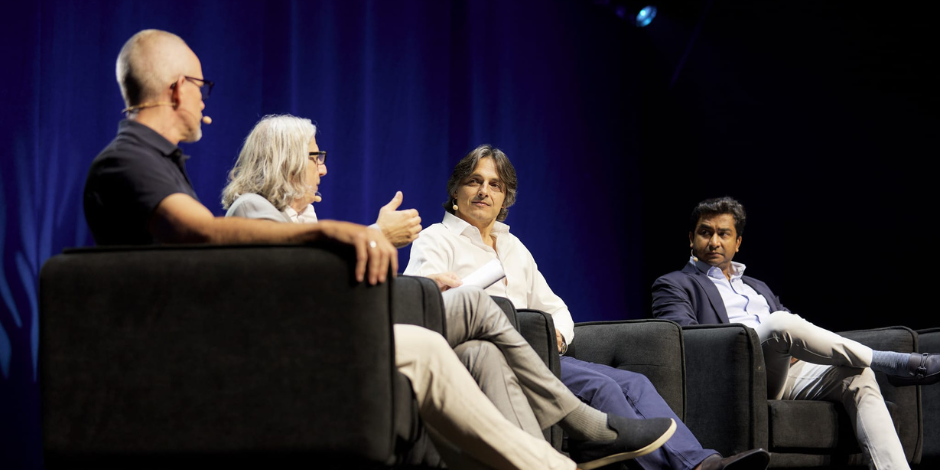Climate, transparency and fintech: Six trends driving VC investment in agrifood tech
Global investment in agrifood technology has steadily increased over the past decade or so. So, what’s driving this growth? Between decarbonisation, supply chains and innovation in the field (literally) big opportunities lay ahead.

Here we explore six key trends driving the investment decisions of some of the sector’s most prominent and influential Venture Capitalists (VC).
1. Decarbonisation of agriculture
Anuj Maheshwari, Head of Agri-Food at global investment company Temasek, mentions that decarbonisation is a key point of interest.
This is going to be a long-term challenge to tackle.
“I see the decarbonisation of livestock, rice and fertilisers as critical, and we are investing in companies that are decarbonising parts of these systems,” he said.
2. Climate resilience
In a similar vein, Anuj pointed to climate adaptation and resilience, noting that Temasek has “doubled down” on its focus in this area.
It has already invested in businesses working on drip irrigation, greenhouses and biologicals.
“Obviously there is so much to do in the food and agriculture value chain.”
RELATED: Big money and big ideas as global venture capitalists talk investment in agrifood
Closer to home, Matthew Pryor, Co-Founder of Australian agritech venture firm Tenacious Ventures, also suggested he’s keeping a close eye on any tech to support producers in the face of tough environmental conditions.
“You don’t need to look very far to see a very wide range of difficult circumstances Australian farmers are facing,” he said.
“The ability to be resilient, and ideally thrive in a variable climate – there are a lot of technologies that are going to make that easier. Those are the areas we [Tenacious Ventures] are really excited about.”
3. Fintech in agrifood tech
Adam Anders, Managing Partner at Anterra Capital, sees an opportunity for the agricultural industry to capitalise on the way fintech has transformed the financial sector. And that this could mean opportunities for more sophisticated financial products in agriculture.
Insurance products, loans, hedging and risk products, for example, could add value for farmers and lead to a more efficient value chain.
Adam highlighted one of Anterra’s portfolio companies, ProducePay, which provides working capital loans to fresh produce growers in Latin America.
Some 40% of the fresh produce in the US comes from Latin America, but farmers are “starved of capital,” Adam said.
“They’re also starved of fair price information, transparency through the value chain and
deal with multiple actors taking a trade with no value addition.
“Basic information, some capital, and Software-as-a-Service in terms of tracking of loads and taking out the middleman can result in more fresh produce at a better price, more money for the farmer and hopefully better products for the consumers.”
4. Integrity in the supply chain
According to Ethy Levy, Managing Partner at Israeli VC Kinneret Impact Ventures consumers are influencing big food companies, and the food production system as a whole.
“There’s an increasing consumer focus on fair-trade and ethical production,” she said.
“Beyond the quality and provenance of food, we want to know how much of our food dollar is going to the grower.”
5. Changes on the ground
Matthew suggested changes at the farm level will lead to benefits, and even transformations, further along the supply chain. But if we’re asking farmers to do things differently, it has to add value for them.
“Farmers are risk managers, and while there will be a whole new suite of tools, we need to think about what incentives we can give farmers to use these tools to do things differently or better,” he said.
His Co-Founder Sarah Nolet believes responding to pressures on the supply chain will require innovation at all levels.
“We need new tools for resilience, and this will mean new technologies and new business models throughout the value chain,” she said.
“That’s going to take research and development, on-farm innovation and venture funded solutions.”
6. Success breeds success
While there are challenges across the whole agrifood tech value chain, Adam believes we’re only in the early stages of tackling them with tech.
“The transformation is beginning,” he said.
The startups Anterra backed in its earliest days are now starting to “see serious success”, and are making a real difference in their fields.
“That will help other companies to follow. It will help the actual food system to improve, and it will allow us to raise more capital and back more companies,” said Adam.
“We’ve got a great tailwind in terms of momentum in food and agtech. I hope that’s going to continue and I hope Australia is well positioned to be a part of it.”
Anuj Maheshwari, Matthew Pryor, Adam Anders and Victor Friedberg took part in a panel discussion hosted by Ethy Levy at evokeAG. 2023. Sarah Nolet participated in a fireside chat, with Michael Dean, Partner, AgFunder.
Early bird tickets are now on sale for evokeAG. 2024 to be held on 20-21 February 2024 in Perth, Western Australia. Following a sell-out event in 2023 we are encouraging delegates to secure their tickets, flights and accommodation early.
We look forward to seeing you in Perth for evokeAG. 2024, in the meantime, catch up on the other conversations about sustainability, climate resilience and the role of agtech in meeting those challenges from evokeAG. 2023 here.
